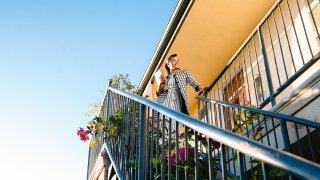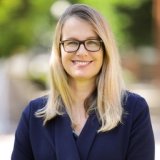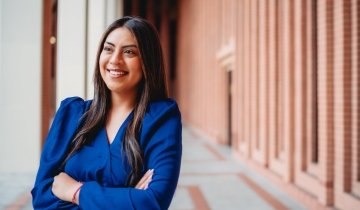Kia Hill didn’t know it at the time, but she has been preparing for her career in instructional design since she was a homeschooler in Indianapolis more than a dozen years ago.
The fourth oldest of 11 children, she regularly found herself helping her younger siblings learn difficult concepts, whether by drawing diagrams to explain lipids’ connection to cholesterol or building toy cars to demonstrate momentum and velocity. And if the computer needed debugging, she was the tech-savvy one first in line to assist.
Hill entered Indianapolis’ public school system in ninth grade, attending Crispus Attucks High School, a medical magnet where Hill was exposed to career paths in science and technology. At Purdue University, where she had a full-ride scholarship, Hill initially pursued a premed track. But after flirting with becoming a forensic pathologist—the result of scientific research and watching many episodes of TV’s Forensic Files in high school—Hill came to regard “looking in a magnifying glass all day a tad boring.”
Yet she still felt passionate about working in health care. After noticing a job posting in medical education, her career plans fell into place. “I said, ‘This is perfect for me,’” she recalled. “This is a way I can help improve patient outcomes by providing high-quality continuing medical education to providers so they can practice at the top of their licensure.” Armed with a bachelor’s degree in interdisciplinary biology, she went to work for a health network in Indianapolis before moving to California in 2018.
Since 2019, she has balanced her job as the continuing medical education (CME) coordinator for Los Angeles-based AltaMed Health Services with her studies at USC Rossier, where she will complete the online Master of Education in Learning Design and Technology program in May.
The LDT program is aimed at people who want to start or advance careers in educational program design, whether in K–12, higher education, corporate training or other environments. Hill was drawn to the flexibility afforded by the program’s online approach and its balance of instructional design, learning theory and technology.
“Being a trailblazer is not always easy. There were a lot of things I had to learn on my own, like finding a network of people to support me with guidance and recommendations.” —Kia Hill, USC Rossier ME student
The program has been conducted entirely online since its launch in 2014, so when the pandemic struck, Hill and her fellow students kept up with classes without disruption. Because the program emphasizes online-learning design, course content didn’t have to change, but many students adjusted their capstone projects to reflect COVID-19 reality. “At the minimum,” LDT faculty chair Helena Seli noted, “students are designing hybrid experiences with reduced in-person interactions,” but some are reorienting their projects to 100 percent virtual learning.
For her capstone project, Hill is helping to implement a learning-management system with Jazz Hands for Autism, a nonprofit founded by USC alumna Ifunanya Nweke ’16 that helps musicians on the autism spectrum find and succeed in music-related jobs. Hill feels an affinity for Jazz Hands’ students, who face obstacles in landing paid positions as performers, composers, music teachers and audio technicians. As a first-generation college student from a low-income family, she has faced challenges related to access to opportunities.
“Being a trailblazer is not always easy,” she said. “There were a lot of things I had to learn on my own, like finding a network of people to support me with guidance and recommendations.”
At the same time, she noted, growing up in her extra-large, bustling household helped her develop the initiative, patience and organizational skills that have proved advantageous in her career. The support she has received from USC Rossier faculty has also been crucial as she generates more online learning opportunities at work. “I have been applying everything I learn into practice,” she said. She has concentrated on curating online resources and designing short, impactful virtual learning sessions for AltaMed’s busy providers.
Hill said her long-term goal is to become a CME director. She would eventually like to create a consulting business to help educational organizations manage online-learning systems and implement education technology.
“The pandemic solidified for me that technology is evolving and more important than ever,” Hill said. “My challenge is, how do I leverage technology to keep everyone together, especially during these unprecedented times.”





